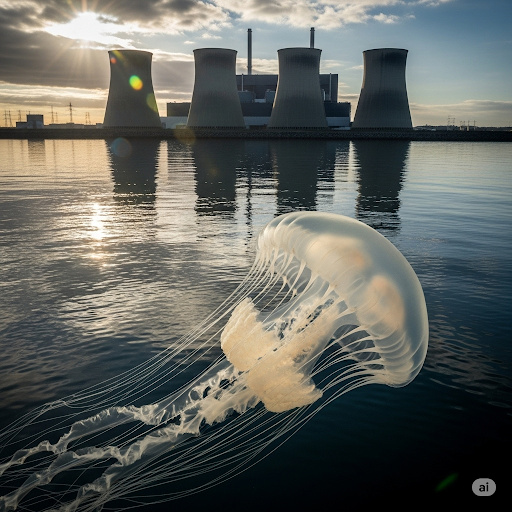
Paris - Saba:
The French energy group "EDF" announced the complete shutdown of the Gravelines nuclear power plant, the largest in Western Europe, late Monday evening, after a massive swarm of jellyfish caused a blockage in the cooling system pumps, leading to the shutdown of four of its six reactors.
The crisis began on Sunday evening when the pump station filters were filled with an "unexpected" swarm of jellyfish, causing the automatic shutdown of reactors 2, 3, and 4 before midnight, followed by reactor 6 on Monday, according to Sputnik News Agency.
The other two units had already been shut down for maintenance, resulting in a complete shutdown of the plant.
EDF confirmed that the automatic shutdown of the four units did not affect the safety of the facility, the workers, or the surrounding environment, noting that the plant teams are currently diagnosing the issue and conducting the necessary interventions to safely restart the reactors.
The Gravelines plant is located in northern France between the cities of Dunkirk and Calais and is considered the largest in Western Europe, with a production capacity of 900 megawatts per reactor.
The plant plans to add two new reactors, each with a capacity of 1,600 megawatts, by the year 2040.
The beaches near the plant have witnessed a noticeable increase in the number of jellyfish in recent years, attributed to rising water temperatures and the spread of invasive species.
Derek Wright, a marine biology consultant with the U.S. National Oceanic and Atmospheric Administration (NOAA), explained that the warming of the North Sea prolongs the jellyfish breeding season, which increases their numbers.
He pointed out that jellyfish, such as the Asian moon jellyfish observed in the North Sea in 2020, can be transported via ballast water in ships, contributing to their global spread.
Wright added that these species prefer calm, plankton-rich waters, such as harbors, making them a threat to nuclear power plants, as has previously occurred in China, Japan, and India.
He raised concerns about thermal pollution caused by nuclear plants, which may exacerbate this issue.
The French energy group "EDF" announced the complete shutdown of the Gravelines nuclear power plant, the largest in Western Europe, late Monday evening, after a massive swarm of jellyfish caused a blockage in the cooling system pumps, leading to the shutdown of four of its six reactors.
The crisis began on Sunday evening when the pump station filters were filled with an "unexpected" swarm of jellyfish, causing the automatic shutdown of reactors 2, 3, and 4 before midnight, followed by reactor 6 on Monday, according to Sputnik News Agency.
The other two units had already been shut down for maintenance, resulting in a complete shutdown of the plant.
EDF confirmed that the automatic shutdown of the four units did not affect the safety of the facility, the workers, or the surrounding environment, noting that the plant teams are currently diagnosing the issue and conducting the necessary interventions to safely restart the reactors.
The Gravelines plant is located in northern France between the cities of Dunkirk and Calais and is considered the largest in Western Europe, with a production capacity of 900 megawatts per reactor.
The plant plans to add two new reactors, each with a capacity of 1,600 megawatts, by the year 2040.
The beaches near the plant have witnessed a noticeable increase in the number of jellyfish in recent years, attributed to rising water temperatures and the spread of invasive species.
Derek Wright, a marine biology consultant with the U.S. National Oceanic and Atmospheric Administration (NOAA), explained that the warming of the North Sea prolongs the jellyfish breeding season, which increases their numbers.
He pointed out that jellyfish, such as the Asian moon jellyfish observed in the North Sea in 2020, can be transported via ballast water in ships, contributing to their global spread.
Wright added that these species prefer calm, plankton-rich waters, such as harbors, making them a threat to nuclear power plants, as has previously occurred in China, Japan, and India.
He raised concerns about thermal pollution caused by nuclear plants, which may exacerbate this issue.